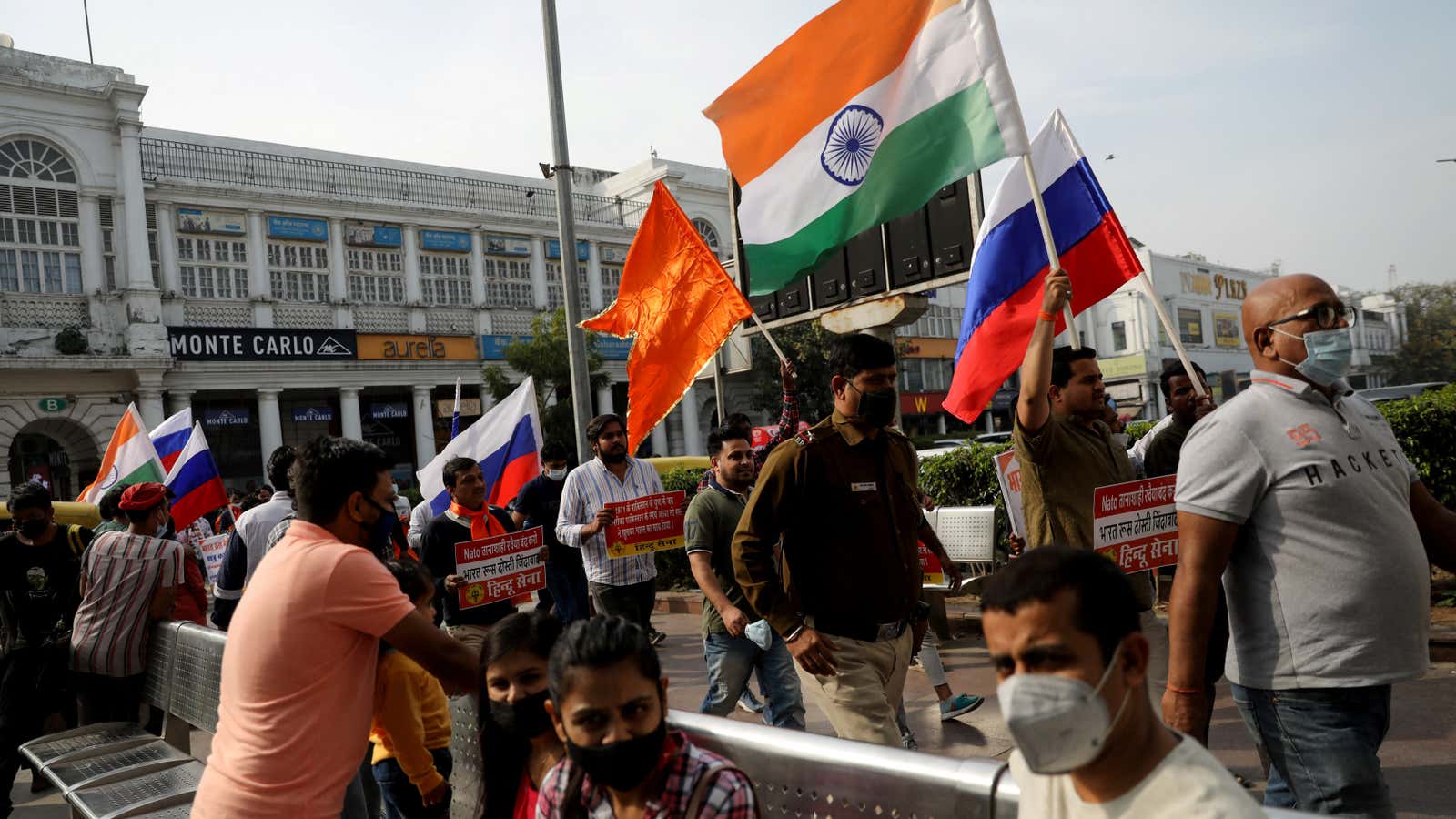A circular dated March 3, purportedly issued by the Indian government and asking its nationals to leave Russia, has been doing the rounds on social media for the past few days. The Indian embassy in Moscow has clarified that it is fake.
A question, nevertheless, remains: Given the rising tension in the region, would it be better for Indians to leave?
Many experts are of the opinion that it is and that India should follow in the US and France’s footsteps and move their citizens out.
Even if the war doesn’t end immediately, daily life is bound to get more and more difficult for Russians as resources get squeezed. The Indian diaspora there—about 14,000 of them—is inevitably going to face the heat.
“Due to the impending economic uncertainty, as well as stark security concerns, Modi should issue an advisory, warning Indian citizens living in Russia to leave the country as soon as possible; and the Indian government should work to evacuate as many Indian citizens as possible,” Tiffiany Howard, an associate professor at University of Nevada, Las Vegas, told Quartz.
Clearly, the immigrants themselves are already desperate.
Some experts even expect the emerging situation in Russia to get as bad as that post the fall of the Soviet Union.
“The Russian economy is being targeted in the way that the Venezuelan and Iranian economies have been targeted, but in some ways much more stringently. Unemployment, food shortages, heating shortage, etc. could be worse than (in) the 1990s. Inflation is already galloping as the rouble is in a free fall. Crime will, like the 1990s, spike as it always does during economic downturns,” said Matthew Payne, a history professor at Emory University who lived in the former Union of Soviet Socialist Republics through the 1990s.
“The war will make life in Russia poorer, more dangerous, and generally grimmer where finding basic supplies even of the stuff Russia exports (grain, petroleum) very different as it takes time to repurpose supply chains. “
Food, fashion, and more in flux
Much of the fighting is currently concentrated in Ukraine, but life in mainland Russia is tumultuous already. The US and the UK are banning oil exports from the country to cripple its economy. The internet there is drastically curtailed by authorities.
Several foreign companies, including fast-food chain McDonald’s, Coca-Cola, and retailer Zara, have stopped operating in Russia. Some, like Uniqlo, are sticking around as a “necessity” for civilians, but the options are few.
Money in a mess
When companies press pause, employees, particularly immigrants, go into a tizzy. In Russia, a handful like McDonald’s, Estee Lauder, Adidas, and Nike, may continue to compensate workers, but most others have no plans laid out.
Those earning from online platforms like AirBnB and Google’s YouTube, which have suspended their Russians ops, are left in the lurch.
Furthermore, sending and receiving money in Russia are increasingly a task given that Visa, Mastercard, and American Express have all pulled out. Other money transfer companies like Wise, Remitly, Zepz, and TransferGo have blocked their services, too.
Cryptocurrency is an option, albeit a limited one given the regulatory hurdles in India. For now, prepaid cards are the best bet, according to at least two experts.
Few flights to get out
The bi-weekly Delhi-Moscow route is likely to be suspended. Some Russian airlines are no longer allowed to fly planes leased in the West, which means travellers could risk getting stranded in a third country if the plane is impounded there.
As airlines around the world scramble to cancel flights and plan alternate routes to avoid Russian airspace, those remaining few, and longer flights, are likely to turn expensive.
“People might want to take a train to a convenient border, say, Finland’s, and fly out of that country but travel is about to get very, very expensive for everyone, not just those trying to leave or enter the Russian Federation,” Payne said.
Indian immigrants come last
If things do take a turn for the worse, Indian immigrants will not be top of mind for Russian authorities to rescue.
“As we are seeing with refugees fleeing from Ukraine, African and Indian immigrants have faced blatant discrimination which has impeded their ability to leave the country,” says Howard.
Prime minister Narendra Modi’s government has avoided denouncing Russia’s “special military operation” but Indians should not consider themselves immune.
“Russia is a fairly anti-immigrant regime already and anti-immigrant right-wing parties are quite vocal. I don’t know of any targeting of south Asian immigrants, but central Asian immigrants are subject to constant harassment and abuse,” Payne said. “As the economy craters, I expect this nativism to grow worse.”
